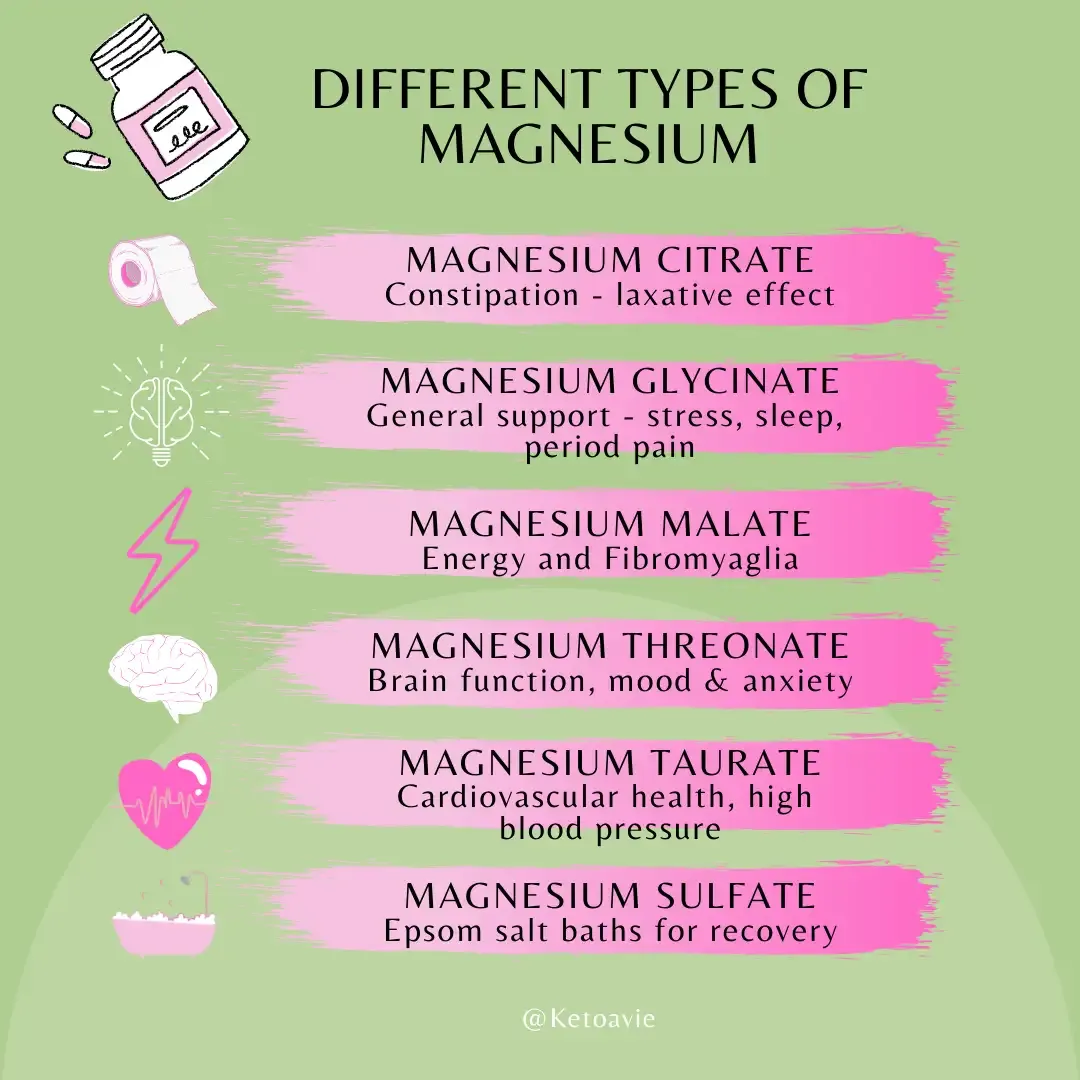Magnesium Supplements: Exploring its Varied Forms for Optimal Health & Which One is Right for You?
Unveiling the Importance of Magnesium for Optimal Health
Welcome to a comprehensive guide shedding light on the often-overlooked mineral - magnesium. Magnesium plays a pivotal role in over 300 enzymatic reactions (*) in the body, influencing muscle and nerve function, blood sugar control, and blood pressure regulation. Unfortunately, many fall short in their magnesium intake, making supplements a pivotal option for meeting the body's needs.
Moreover, magnesium significantly influences insulin sensitivity (*), crucial for managing insulin resistance. Optimizing magnesium intake contributes to better blood sugar control and improved insulin function, making it essential for those navigating insulin resistance challenges. However, choosing the right magnesium supplement can be overwhelming due to the various available forms.
Understanding the Different Forms of Magnesium Supplements
When it comes to magnesium supplementation, several forms - salt, chelate, and amino acid - populate the market. Each has distinct characteristics and efficacy in addressing certain health concerns.
Differentiating Salt, Chelate, and Amino Acid Forms
- Salt forms (*) such as magnesium oxide or magnesium chloride are economical but may have lower bioavailability, limiting absorption by the body.
- Chelate forms (*) like magnesium glycinate or magnesium lysinate are costlier yet better absorbed and utilized.
- Amino acid forms (*) like magnesium aspartate or magnesium taurate offer improved absorption and potential effects on neurotransmitters and muscle function.
Choosing the Right Magnesium Form for Specific Health Concerns
A Comprehensive Guide to Different Magnesium Supplement Types
Let's delve into various magnesium forms and their suitability for specific health concerns:
- Magnesium Oxide : Primarily used as a laxative for constipation relief and addressing stomach-related issues.
- Magnesium Chloride : Applied topically to relax muscles, alleviate pain, and reduce cramps.
- Magnesium Citrate : Known for its gentle laxative effect, aiding in constipation relief by promoting bowel movements.
- Magnesium Sulfate (Epsom Salt) : Popular in Epsom salt baths, aiding muscle relaxation and stress relief.
- Magnesium Glycinate : Offers gentle absorption, aiding in stress management, better sleep, and period pain relief.
- Magnesium Lysinate : Highly absorbable, beneficial for sleep, muscle cramps, anxiety, and stress.
- Magnesium Malate : Supports muscle relaxation, potentially easing fibromyalgia symptoms, while providing an energy boost.
- Magnesium Aspartate: Enhances muscle function and reduces cramps due to its bioavailability.
- Magnesium Taurate : Ideal for cardiovascular health, regulating blood pressure, and supporting heart function.
- Magnesium Orotate : Boosts bone health and reduces muscle cramps effectively.
- Magnesium Threonate : Aids in enhancing brain function, mood, and anxiety alleviation.
Navigating Your Magnesium Journey
In summary, magnesium's significance is immense, yet choosing the suitable supplement form can be daunting. Consulting a healthcare professional is imperative, considering individual needs, medical history, and dietary habits. Remember, your magnesium journey begins with professional guidance, ensuring optimal wellness and personalized supplement selection.
Closing Nutritional Gaps with Healthy Magnesium-rich Foods
Closing the gap with dietary magnesium is possible through leafy greens, nuts, seeds, fish, and whole grains. However, supplementation is a direct route to fulfilling requirements. Different forms address varying concerns - oxide for constipation and glycinate for relaxation and sleep.
The quest for the right magnesium supplement aligns with your health goals. While oxide aids constipation, glycinate aids relaxation.
In conclusion, magnesium's role in bodily functions is pivotal but often overlooked. Deficiency poses health risks, emphasizing the importance of adequate intake through diet or supplements. Amidst varied magnesium forms, understanding differences and individual needs is key.
Exploring Magnesium Supplements through Q&A
Q: What role does magnesium play in the body?
A: Magnesium is involved in over 300 enzymatic reactions in the body, influencing muscle and nerve function, blood sugar control, and blood pressure regulation.
Q: Why might someone need magnesium supplements?
A: Many people don’t get enough magnesium through their diet. Supplements ensure adequate intake, especially for those dealing with magnesium deficiency or specific health concerns.
Q: What's the difference between salt, chelate, and amino acid forms of magnesium?
A: Salt forms are economical but might have lower bioavailability. Chelate and amino acid forms are better absorbed, offering distinct benefits like improved neurotransmitter effects.
Q: Which magnesium supplement form is best for constipation?
A: Magnesium oxide and citrate are often recommended for constipation relief due to their gentle laxative effects.
Q: What magnesium supplement aids in muscle relaxation?
A: Forms like magnesium chloride, sulfate (Epsom salt), glycinate, lysinate, and malate are known for their muscle-relaxing properties.
Q: What factors should be considered before choosing a magnesium supplement?
A: It's crucial to consider individual health concerns, absorption rates, and possible interactions with medications. Consulting healthcare professionals is recommended.
Q: What is magnesium good for?
A: Magnesium is essential for various bodily functions, such as muscle and nerve function, blood sugar regulation, blood pressure control, and energy production.
Q: Is it OK to take magnesium every day?
A: Yes, it's generally safe to take magnesium supplements daily, especially if you have a deficiency or specific health concerns. However, it's advisable to follow recommended dosages.
Q: What are the 10 signs of low magnesium?
A: Some signs of low magnesium include muscle cramps, tremors, fatigue, mood swings, irregular heartbeat, high blood pressure, and migraines. However, it's best to consult a healthcare professional for diagnosis.
Q: What foods are highest in magnesium?
A: Foods rich in magnesium include leafy greens (spinach, kale), nuts and seeds (almonds, pumpkin seeds), legumes, whole grains, fish (salmon, mackerel), and dark chocolate.






Comments
Post a Comment